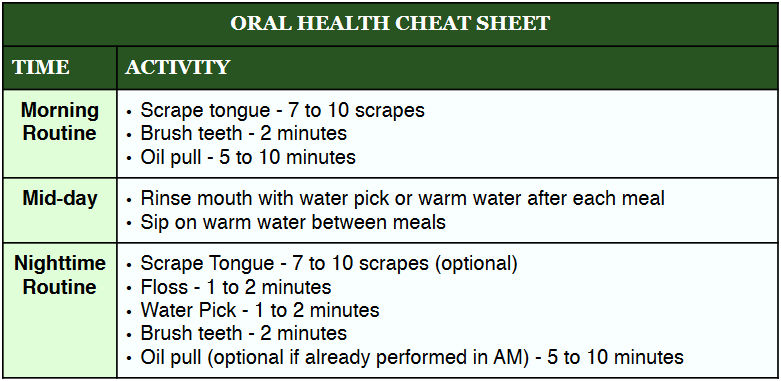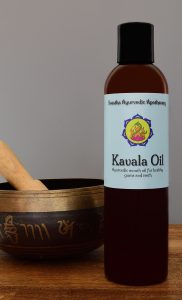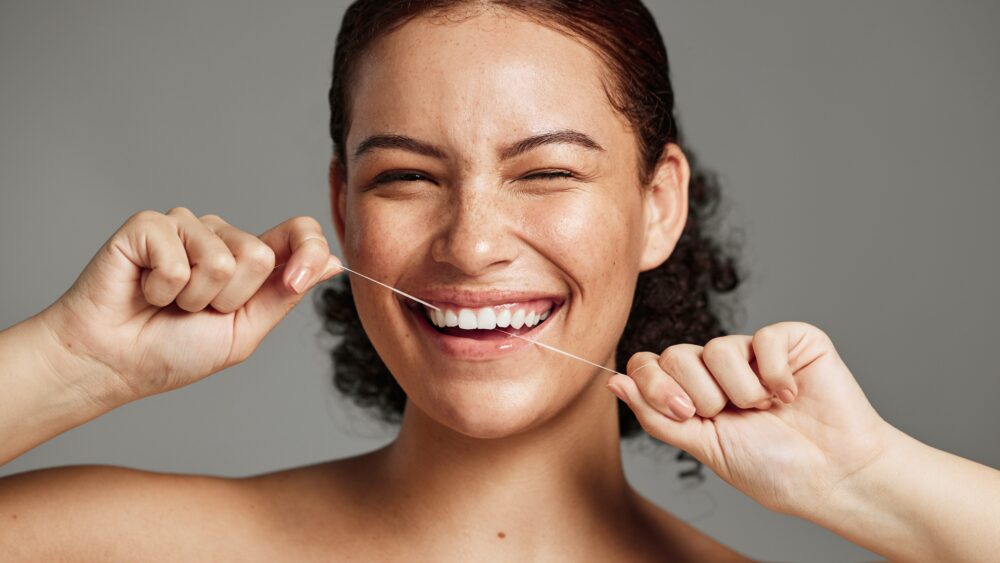 We all know the importance of oral health for our teeth and gums, but did you know that oral health has a direct effect on our systemic health as well? Numerous studies reveal a strong connection between certain pathogenic microbes in the mouth and multiple health conditions including diabetes, Alzheimer’s, heart disease, inflammatory conditions, and autoimmune disorders. This means that poor oral health may not only be a sign of more serious conditions, but it can also be a causative factor.
We all know the importance of oral health for our teeth and gums, but did you know that oral health has a direct effect on our systemic health as well? Numerous studies reveal a strong connection between certain pathogenic microbes in the mouth and multiple health conditions including diabetes, Alzheimer’s, heart disease, inflammatory conditions, and autoimmune disorders. This means that poor oral health may not only be a sign of more serious conditions, but it can also be a causative factor.
The oral microbiome contains about 700 various species of microbes making it the largest microbiome aside from the gut. Around 45% of the microbes in the mouth can also be found in the gut suggesting a strong connection between our oral health and our digestive health. With a direct route to your GI tract, the pathogenic microbes in your mouth can easily find a home in the GI tract, triggering inflammatory GI disorders, gut dysbiosis, and other digestive disturbances.
Although Western medicine has just recently discovered the correlation between oral health and systemic health, Ayurveda has recognized the importance of oral health for thousands of years. The mouth is considered the mukha, or opening, to three of the 16 main channels (srotamasi) of the body; specifically the GI tract (Anna Vahasrotas), the respiratory tract (Prana Vahasrotas), and the “water channel” (Ambu Vahasrotas). As the origin of these vital channels, it is not too surprising that imbalances in the mouth will inevitably lead to imbalances in these channels over time.
Ayurveda uses the mouth as a window into the total health of an individual. One helpful tool is tongue analysis which involves “reading” the tongue to indicate disorders of the doshas, organs, digestion, and even emotions. Examples include, bad breath and a heavy tongue coating are clear indicators of excessive toxins, dryness suggests high Vata, paleness indicates anemia, and tongue scalloping suggests malabsorption.
Ayurveda states that the teeth are an upadhatu or bi-product of the bones. This suggests that keeping the bones strong and healthy is essential for keeping the teeth healthy as well. It also suggests that brittle, fragile, or decaying teeth may indicate weakness in the bones. Recent Western studies (such as this one) have supported this theory with findings that individuals with osteoporosis are more likely to have poor oral health, with cavities and tooth loss being their main issues. This shows that keeping the bones strong and healthy can have a positive effect on your teeth.
Western medicine has found a very strong and direct correlation between periodontal disease and diabetes, Alzheimer’s, dementia, heart disease, stroke, arteriosclerosis, respiratory disease (e.g. pneumonia), autoimmune conditions (e.g. rheumatoid arthritis), inflammatory conditions, sinus issues, and pregnancy complications. This correlation stems from pathogenic microbes that are present in periodontitis spreading throughout the system (via the lungs, GI tract, bloodstream, etc) leading to issues such as systemic inflammation, plaque in the brain, plaque in the arteries, and increased blood sugar levels to name a few. Therefore, taking care of your oral health helps to prevent disease and promote optimal health on a systemic level.
It is never too late to improve your oral health. Of course, prevention is always best, but if that ship has sailed, then today is the day to get started. So no matter your age or level of oral health, make these oral healthcare practices a part of your daily routine and take control of your oral (and total) health!
Cheat Sheet for Daily Oral Care
Before getting into too much detail, here is a concise chart that shares my suggestions for teeth-cleaning practices to begin and end your day. This includes the recommended order to perform them. Keep reading for a more detailed explanation of each practice (and many more suggestions!)

Click here for a printable copy of this chart.
Improve Your Oral Health with Ayurveda
Full disclosure: Any Amazon links are through an affiliate-based program, but are recommended with honesty and care.
1. Brush twice a day (the right way!)
Brushing twice daily is the first step to optimal oral health. This should be done each morning and before bed using an electric toothbrush (I love my Sonicare!) for about 2 minutes per brushing. Make sure to replace your toothbrush head every 3 to 4 months.
Additional brushing tips for avoiding enamel and gum loss:
- Use a soft bristled brush.
- Avoid adding pressure while brushing; if this is difficult, try holding your toothbrush with only your two fingers and thumb.
- Avoid brushing your teeth for at least 30 to 45 minutes after eating—the enamel softens after eating due to a temporary decrease in pH in the mouth; brushing too soon after eating can weaken and damage the enamel.
2. Avoid harsh ingredients in your toothpaste.
The ingredients in your toothpaste will have a positive or negative effect on your oral microbiome health and can even have an impact on other areas of your body such as your gut, liver, and nervous system. Here is a non-exhaustive list of ingredients to avoid in your toothpaste:
- Triclosan (harsh antibacterial agent)
- Sodium Lauryl Sulfate (SLS) (harsh detergent that can lead to leaky gut and mouth)
- Parabens
- Titanium dioxide
- Fluoride (considered a neurotoxin)
- Carrageenan
- Saccharin
- Aspartame
- Alcohol
- Propylene Glycol
- Cocamidopropyl betaine (considered an eco-toxin)
- Diethanolamine (DEA)
3. Strengthen and remineralize your teeth with Hydroxyapatite toothpaste.
To keep your enamel strong without the use of fluoride, a NASA-discovered substance known as hydroxyapatite (HAp) is recommended. Hydroxyapatite is a form of calcium that makes up 97% of your tooth enamel and 70% of the dentin of your teeth.
According to oral microbiome specialist, Dr Marc Burhenne: “Hydroxyapatite acts by replacing the minerals your teeth lose when they’re demineralized and filling in the tiny “fissures” or “scratches” in your teeth that otherwise play host to bacteria.”
Hydroxyapatite is considered safe and suitable for adults and children alike. It is said to be useful in cavity prevention and has shown potential in strengthening gums and whitening teeth as well. Unlike fluoride, it promotes a healthy oral microbiome rather than wiping out your much needed oral flora.
I personally use RiseWell’s Wild Mint Toothpaste and my young son loves their Vanilla Cake Batter toothpaste (both use hydroxyapatite). RiseWell also has an amazing microbiome-friendly mouthwash* and PFAS Free Floss that come highly recommended!
*This mouthwash was the only remedy that worked for my client in getting rid of her tonsil stones after years of dealing with them!
4. Water pick after meals and before bed.
You may be surprised to see how much food is often left behind in the pockets of your mouth after eating. This creates a lower, more acidic, pH environment and can lead to cavities, receding gums, and inflammation, especially if you are eating sweet or carb-rich foods.
When available, use your water pick (sometimes called a “water flosser”) 30 minutes after each meal to remove any remaining food particles. If you do not have a water pick at hand, simply use some warm water to swish your mouth out thoroughly directly after eating.
Although the water pick does not replace flossing, it can be very beneficial to perform each night before bed to remove any sneaky food particles from the tiny pockets in your mouth. I suggest water picking directly after flossing but before brushing during your nighttime mouth-cleaning routine. This practice has been a game-changer for me!
Here is a recommended water pick. To keep your water pick working at its best (and avoid mold) make sure to empty the tub and tube of all water each night and rinse it with vinegar water every few months.
5. Scrape your tongue each morning.
Have you ever noticed a coating on your tongue when you wake up in the morning? This is a natural occurrence of your body trying to push out toxins and dead bacteria through your tongue. To avoid reabsorbing this toxic sludge (called ama), it is essential to scrape your tongue first thing each morning after getting out of bed.
This habit will also stimulate and awaken the digestive system and visceral organs, as they correlate with the different areas of the tongue. And of course, it will prevent bad breath (halitosis) and promote a sharper sense of taste.
Stainless steel tongue scrapers are said to be tridoshic and suitable for all body types. Copper tongue scrapers are best for Kapha and Vata types. Always avoid plastic tongue scrapers which have a tendency to harbor unwanted bacteria and contain unwanted chemicals.
Purchase our Stainless Steel Tongue Scraper here.
Purchase our 100% Copper Tongue Scraper here.
6. Floss each night.
Flossing is an extremely vital part of any oral healthcare routine. In fact, I have heard many dentists claim it is equally as important as brushing. Flossing strengthens gums, removes food particles between the teeth, and prevents cavities, inflammation, and infection. If you are not flossing, this is the one recommendation I would suggest to start with before anything else.
Each night before bed take 1 to 2 minutes to floss your teeth thoroughly (front and back, uppers and lowers). If you are prone to getting food stuck in your teeth, this can be done during the day (as needed) as well.
Studies have recently shown a toxic chemical known as perfluorohexane sulfonic acid is in many brands of floss including Oral B’s Glide Floss. This chemical has been linked to cancer, liver damage, developmental issues, and environmental toxicity. Aim for a non-toxic floss such as this PFAS Free Floss from Risewell (it also has Hydroxyapatite!).
7. Perform 5 minutes of oil pulling, 1 to 2 times daily.
Oil pulling is known as Gandush or Kavala in Ayurveda, and is another daily routine essential. Oil pulling is said to strengthen the teeth and the gums, reduce inflammation, remove toxins, freshen the breath, heal mouth sores, and promote a healthy oral microbiome. It is traditionally done in the morning but can be done as part of your bedtime routine if it is more convenient. For those suffering from more severe mouth conditions (such as receding gums), it is recommended to perform twice daily (AM & PM) for best results.
For at-home oil-pulling options, Kapha and Vata types can use sesame oil while Pitta types should use coconut oil. For the greatest benefit and a refreshingly minty taste, you can use our tridoshic Kavala Oil which is infused with cleansing, soothing, anti-inflammatory herbs such as Neem, Licorice, Clove, Guduchi, Bala, and Triphala.
Purchase our Kavala Oil (for oil pulling) here!
8. Sip warm water between meals.
Sipping warm water throughout the day is an Ayurvedic staple for kindling digestion, flushing toxins, and yes, promoting oral health. Sipping water regularly between meals keeps the mouth hydrated which will create a less acidic environment in the mouth. A higher pH level in the mouth (meaning less acidic) supports healthy bacteria while a more acidic environment harbors pathogenic bacteria and inflammation.
9. Avoid drinking sweet beverages and grazing between meals.
Anytime you eat food (especially carb-rich foods) or drink a sweetened beverage, the bacteria in your mouth release acids that lower the pH of your mouth. If this becomes a routine habit, then your mouth will be in this state of “acid attack” much more frequently than nature intended. The continuous state of a lower pH promotes dysbiosis (flora imbalance) in the mouth leading to cavities, demineralization, bad breath (halitosis), receding gums, inflammation, and infections.
10. Keep your digestion strong.
A strong digestive fire means a healthy gut microbiome and less toxins overall; both important factors for supporting oral health. Digestive issues such as hyperacidity or acid reflux can lead to oral health issues as well including receding gums, cavities, demineralization, and inflammation.
11. Limit sugar, refined grains, and processed foods.
Eating a diet heavy in sweets, refined grains, and processed foods is a welcome invitation for pathogenic bacteria (in the mouth and gut). These foods also support inflammation and weakened immunity which also play a role in oral health issues.
12. Avoid mouth breathing.
Breathing through the nose is recommended for countless reasons including to support your oral health. Mouth breathing is a major cause of dry mouth which creates a more acidic environment. This allows the bad bacteria to thrive and diminishes the good.
Check-in with your breathing throughout the day. Make sure you are regularly breathing through your mouth. If you tend to be a mouth breather, you will need to train yourself to breathe through your nose. If your mouth breathing tends to come while you sleep (which is even more detrimental to oral health), you may need to try a mouth tape to help train yourself at night as well.
13. Avoid teeth grinding.
Stress is a known cause of dysbiosis, inflammation, and teeth grinding (bruxism)—all of which can lead to oral health issues. Teeth grinding weakens enamel causing enamel erosion and even broken teeth.
Bruxism can be prevented or reduced through stress-relieving therapies, especially before bed (if your teeth grinding is a nighttime issue). Oil pulling and massaging the jaw area, especially directly under the ears with a soothing oil such as Vata Oil can help prevent teeth grinding. If nothing seems to be working, it may be necessary to wear a fitted mouthguard at night. This will not stop you from grinding your teeth but will help prevent further damage to your teeth and gums.
14. Nutrients for oral health.
To remineralize and strengthen your teeth and support overall oral health, it is important to ensure you are eating a diet high in these essential vitamins and minerals. Supplementing may be needed if you are eating a healthy rainbow diet but still falling short of these nutritional needs. I generally aim for liquid-based supplements with no added flavors, preservatives, dyes, or weird stuff.
- Calcium – promotes remineralization, strengthens tooth enamel, helps repair damage caused by acidic saliva
- Magnesium – promotes remineralization, supports calcium absorption (I use this supplement)
- Zinc – promotes remineralization, helps control plaque and tartar, reduces bad breath, and protects against gum disease (I use this supplement)
- Vitamin D3/K2 – needed for calcium absorption; aids in strengthening tooth enamel (I use this supplement)
- Vitamin A – supports optimal saliva production and tissue repair (including gums and tooth enamel)
Try our refreshing Kavala Oil for oil pulling!




This post was super helpful and really helped me up my oral care routine!
Hi Anna,
Thank you for taking the time to write in. I am happy to hear this! Our oral health is important for countless reasons but can lack attention for many individuals. It is time we get educated and empowered to make these necessary changes today!
Keep up the great work and let me know if any questions come up!
Many blessings,
Danielle